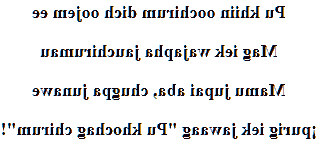Woun Meu love poem
Chi espheg
Pu khiin oochirum dich oojem ee
Mag iek wajapha jauchirumau
Mamu jupai aba, chugpa junawe
¡purig iek jawaag "Pu khochag chirum"!


→ French poem ←
Woun meu language
My love poem translated into the Woun Meu language (alternatives : Wounmeu, Woun Meo, Wounaan Meu, Maach Meu, Noanamá, Chocó, Chocama, Noanama, Noenama, Nonama, Waumeo, Chanco, Waun Meo, Waunana, Waunméu, Waunán).
This chocoan language, is spoken in Panama and Colombia, by a total of 25,000 indigenous Wounaan in the mountain range of the same name, in the region of Chocó.
Spanish and the migration of the youngest to the big cities are a very serious risk, both for language and culture.
Faced with this, to preserve their identity, the Wounaans mobilized after the Colombian government.
There are dictionaries and grammars, which allow good teaching to children.
The first writings concerning the Wounán people are those of a priest, Palacios de la Vega, they date from the end of the 18th century.
Choco people
Originally hunters (blowpipe), gatherers, semi-nomads, the Chocos (Embera and wounaan), lived in the Gulf of Uraba, where archaeological evidence has been found. Today they live in the Wounaan mountain range, which is a very humid forest region.
The conquistadors describe them as very brave warriors, who attack with arrows, made from the wood of palm trees. Their region is full of gold mines, and on their coast there are pearls.
When the Church dispensed with employing natives as labor, the Spaniards brought in a large African labor force.
Since then, the Wounaans have always had close relations with communities of African origin.
Today hunting and fishing are the prerogative of men, while women take care of agricultural crops (maize, cassava, bananas) and make baskets and pottery (werregue vase).
Their clothes (pareo and shirtless), and their habitat often remains traditional (wood and thatch).